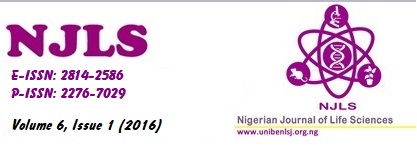IN VITRO GERMINATION AND ?-AMYLASE ACTIVITY OF CYPERUS ESCULENTUS L. TUBERS TREATED WITH METAL AND NACL SOLUTIONS
DOI:
https://doi.org/10.52417/njls.v6i1.313Keywords:
Cyperus esculentus, Amylase, Heavy metal, Germination, InvitroAbstract
The effect of CuSO4, CdCl2, AsO3 and NaCl solutions on germination and ?-amylase
activity of Cyperus esculentus tubers were studied invitro. Concentrations of
solutions applied were 0, 50, 100, 150, 200, 250 and 300 ppm. Viable tubers were
put in sterile Petri dishes previously mounted with Whatman No.1 filter paper and
soaked with the different solutions according to the experimental design. The
treatments were replicated three times. Germination was observed for 14 days and
thereafter the crude extracts of amylase enzyme were prepared from germinated
and ungerminated tubers. ?-amylase activity was measured spectrophotometrically
at 540 nm using 3,5-dinitrosalicylic acid (DNSA) reagent. The results obtained
showed that germination was inhibited by the metal solutions at 50-300 ppm
concentrations applied. The values were significantly different from values recorded
for control treatments (p<0.05). NaCl solutions did not inhibit tuber germination.
Values recorded for ?-amylase activity in the tubers suggested that the enzyme
activity was inhibited by metal solutions (p<0.05). NaCl solutions did not affect ?-
amylase activity in the tubers negatively. The results indicated that stored
carbohydrate in the tubers treated with metal solutions were poorly degraded and
hence the low percent germination response.

Published
Issue
Section
License
Copyright (c) 2016 https://www.unibenlsj.org.ng/index.php/njls

This work is licensed under a Creative Commons Attribution 4.0 International License.





